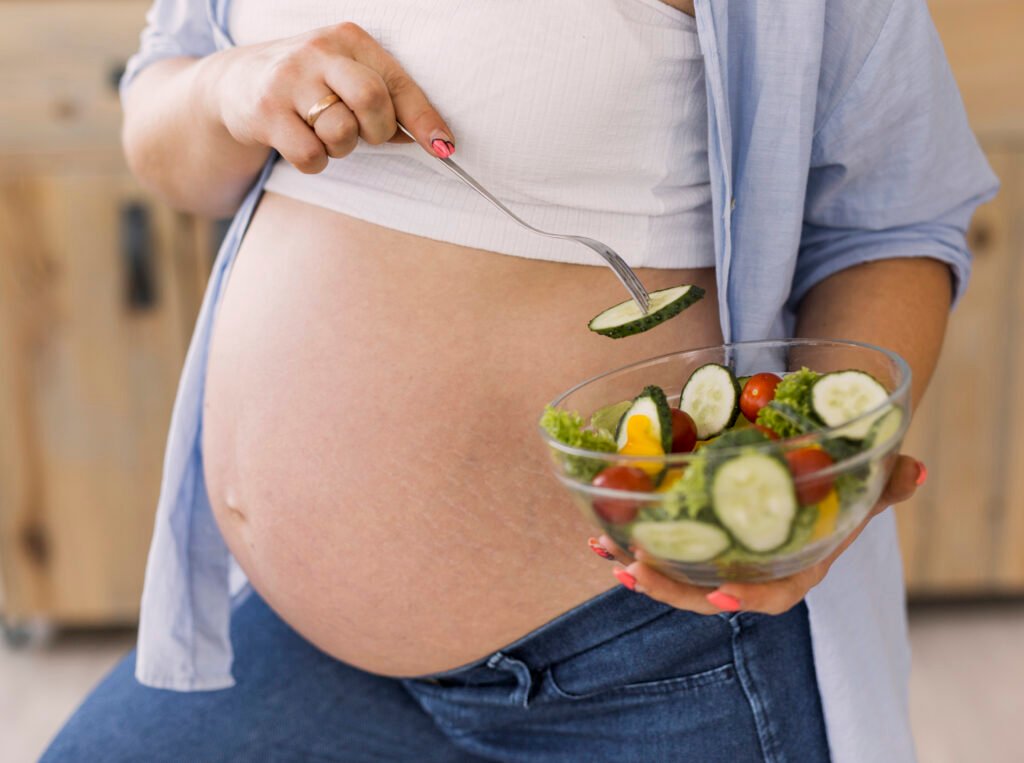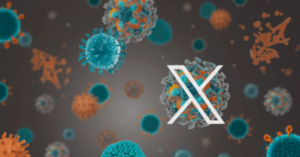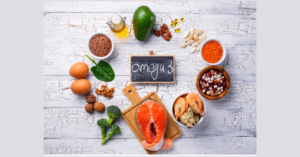Eat Right for You and Your Baby
Pregnancy is a transformative journey that requires special attention to nutrition to support the health and development of both you and your baby. Eating a balanced diet rich in essential nutrients is crucial for ensuring a healthy pregnancy and optimal fetal growth. Here’s your ultimate guide to pregnancy nutrition, providing you with the information you need to eat right for you and your baby:
Table of Contents
1. Understanding Your Nutritional Needs during Pregnancy
Caloric Intake:
While calorie needs vary from person to person, most pregnant women require additional calories during pregnancy to support the growth and development of the baby.

Macronutrients:
Focus on consuming a balanced diet that includes carbohydrates, proteins, and healthy fats to provide essential nutrients for both you and your baby.
Micronutrients:
Pay attention to getting adequate amounts of key micronutrients such as folate, iron, calcium, vitamin D, and omega-3 fatty acids, which play critical roles in fetal development.
2. Building a Healthy Pregnancy Diet
Fruits and Vegetables:
Aim to include a variety of colorful fruits and vegetables in your diet to provide essential vitamins, minerals, and antioxidants.
Whole Grains:
Choose whole grains such as brown rice, quinoa, oats, and whole wheat bread to provide fiber and essential nutrients.

Lean Proteins:
Incorporate lean sources of protein such as poultry, fish, eggs, beans, lentils, and tofu into your meals to support fetal growth and development.
Dairy Products:
Consume dairy products such as milk, yogurt, and cheese to ensure an adequate intake of calcium and vitamin D for bone health.
Healthy Fats:
Include sources of healthy fats such as avocados, nuts, seeds, and olive oil to support brain development and hormone production.
Morning Sickness:
To alleviate morning sickness, opt for small, frequent meals and snacks throughout the day and choose bland, easily digestible foods such as crackers, toast, or ginger tea.
Constipation:
Increase your intake of fiber-rich foods such as fruits, vegetables, whole grains, and legumes, and stay hydrated to prevent constipation.
Heartburn:
Avoid spicy, acidic, and fried foods that can exacerbate heartburn, and opt for smaller meals and snacks to reduce pressure on the stomach.

Food Cravings:
While it’s okay to indulge in cravings occasionally, aim to satisfy them with healthier alternatives whenever possible to maintain balanced nutrition.
4. Hydration during Pregnancy
Water Intake:
Stay hydrated by drinking plenty of water throughout the day, aiming for at least eight to ten glasses daily. Proper hydration is essential for supporting bodily functions and preventing dehydration.
5. Foods to Avoid During Pregnancy
Raw or Undercooked Foods:
Avoid consuming raw or undercooked meats, seafood, eggs, and unpasteurized dairy products to reduce the risk of foodborne illness.
High-Mercury Fish:
Limit intake of high-mercury fish such as swordfish, shark, king mackerel, and tilefish, and opt for lower-mercury options like salmon, trout, and sardines.
6. Supplements during Pregnancy
Prenatal Vitamins:
Take a prenatal vitamin recommended by your healthcare provider to ensure adequate intake of essential nutrients such as folic acid, iron, and calcium.
Omega-3 Fatty Acids:
Consider taking an omega-3 supplement, such as fish oil or algae oil, to support fetal brain and eye development.

Conclusion
By following a balanced and nutritious diet tailored to your individual needs, you can support a healthy pregnancy and give your baby the best possible start in life. Remember to consult with your healthcare provider or a registered dietitian for personalized nutrition advice throughout your pregnancy journey.

10 Proven Benefits of Bananas for Health and Well-being
Bananas are known for their natural sweetness, ease of peeling and rich nutrition. This makes them one of the most commonly consumed fruits in the world. Though bananas originated in

Disease X: The Next Pandemic?
Emerging infectious diseases pose one of the greatest threats to human health and global stability. One of them, “Disease X” has intrigued scientists and WHO, as it represents the potential

The Remarkable Benefits of Eating Acorn Squash in Winter
Acorn squash has all the qualities that make it special. Winter calls for warmth, comfort, and nutrition, and acorn squash provides all of these. This vegetable is not just delicious

Omega-3 Fatty Acids
Omega-3 fatty acids play a very important role in the nutrients needed to maintain overall health. As people are getting to know about it, its popularity is increasing day-by-day. These
Frequently Asked Questions (FAQ's)
Nutrition plays a crucial role during pregnancy as it directly impacts the health and development of both the mother and the baby. A balanced diet ensures that the baby receives essential nutrients for growth and development while supporting the mother’s health and well-being.
During pregnancy, it’s important to focus on consuming a balanced diet that includes a variety of fruits, vegetables, whole grains, lean proteins, and healthy fats. These foods provide essential nutrients such as folate, iron, calcium, and omega-3 fatty acids that are critical for fetal development.
Weight gain recommendations during pregnancy vary depending on pre-pregnancy weight and individual factors. Generally, most women are advised to gain between 25 to 35 pounds during pregnancy. However, it’s essential to consult with your healthcare provider for personalized guidance based on your specific circumstances.
Yes, there are several foods to avoid or limit during pregnancy to reduce the risk of foodborne illness and potential harm to the baby. These include raw or undercooked meats, seafood, unpasteurized dairy products, high-mercury fish, and certain types of soft cheeses.
Prenatal vitamins are recommended during pregnancy to ensure adequate intake of essential nutrients such as folic acid, iron, calcium, and vitamin D. These vitamins help support the baby’s development and can help prevent birth defects and other complications.
Managing morning sickness involves eating small, frequent meals and snacks throughout the day, choosing bland, easily digestible foods, and staying hydrated. Ginger, crackers, toast, and herbal teas are often recommended for alleviating nausea.
It’s normal to experience food cravings during pregnancy, but it’s essential to satisfy them in moderation and make healthier choices whenever possible. Cravings for certain foods may indicate a need for specific nutrients, so listen to your body and aim for balance in your diet.
To ensure you’re getting enough nutrients during pregnancy, focus on eating a variety of nutrient-dense foods from all food groups. Consider consulting with a registered dietitian or healthcare provider for personalized nutrition advice and recommendations.
Yes, exercise is generally safe and beneficial during pregnancy, but it’s essential to consult with your healthcare provider before starting or continuing any exercise routine. Low-influence exercises like strolling, swimming, and pre-birth yoga are frequently suggested.
If you have specific dietary restrictions or food allergies, it’s important to work with a healthcare provider or registered dietitian to develop a personalized nutrition plan that meets your needs while ensuring you and your baby receive essential nutrients.